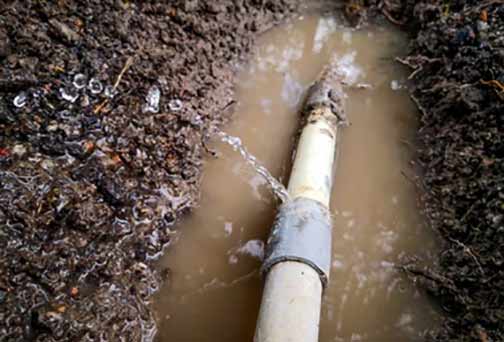
A broken water line anywhere in your home can be a major problem. However, Windermere Management says, if it happens in your yard, finding the source of the problem can be a lot trickier. If the leak is in your main water line, it can result in loss of water pressure, no water supply to your home, or water contamination. A leak can also happen in your irrigation system.
If water is leaking into your yard because of a break in your main water line or damage to your irrigation system, taking quick action to stop the leakage is vital. However, to bring the issue under control, you must know how to locate the leak and the quick-fix steps that will help you minimize the impact of the damage.
We asked experienced plumbers what they would advise homeowners to do during this plumbing emergency in their home. This post is a summary of their recommendations on how to locate and repair a leak in your water main or irrigation systems and the steps you can take to prevent future leaks.
How to find the cause of the leak
When trying to find and fix a leak in your main water line or irrigation system, the following tools will come in handy; a sturdy shovel, a reliable pipe wrench or adjustable pliers, a pair of thick gloves, and an electronic moisture meter to detect the levels of humidity in the ground. You may also need some plumber tape, epoxy putty or any waterproof sealant.
Common causes of leaks in the main water include; corrosion, aging, tree roots intrusion into the line, soil movements that dislodge the pipe and unusual weather events. To find the leak, look for sinkholes in your yard, unusually wet patches of soil in the yard or areas with vegetation/grass that is growing faster than the surrounding areas.
If you suspect the leak is in your irrigation systems, inspect the connections between the system and your main water line. If no problems are observed, check the valves that control water flow through the system, before inspecting the individual zones of your irrigation system.
If you cannot find the cause of the problem, call a professional plumber. Your plumber will have advanced tools for detecting underground water leaks in your yard. They may perform a leak detection test or use other leak indicator tools. You will make the plumber’s job easier by giving them as much information as possible.
Quick-fix methods for a broken water pipe
The following temporary fixes will help you stop the leak until you can get a professional plumber to look at the problem and apply a permanent solution.
Seal the pipe with plumber tape
Plumbers tape is a cheap malleable material for fixing minor leaks quickly. If the leak is from a worn pipe seal, this is a good way to fix it. Before attempting any repairs, stop the water supply by turning off the valve. Next, wrap the threaded portions of the pipe in plumber tape going in a clockwise direction.
Use self-fusing silicone tape
Self-fusing silicone works well on low-pressure leaks. Once in place, it forms a semi-permanent waterproof bond that is not easily removed. To use this method, wipe the pipe or hose clean. Cut the right length of tape and ensure air bubbles are absent between the pipe surface and the tape. Press firmly for a few seconds.
Apply epoxy putty
Epoxy putty will seal holes or cracks in a broken line. This non-toxic material can last for years. To use it, dry the area where you want to apply the putty. Mix the two epoxy components until they have a uniform color and texture. Knead it until it becomes moldable. Apply it on the damaged pipe section and let it cure.
Patch and clamp
This method is for larger pipe breaks. As always, before attempting the repairs, make sure the water is turned off at the main valve. Smooth the sharp edges of the pipe with a metal file and apply a neoprene rubber patch, followed by a repair clamp (use the right size). Ensure that the damaged sections are overlapped before you tighten the clamp.
Tips to prevent future leaks
Apart from those caused by natural wear and tear or soil shift, most pipe leaks can be prevented. Here are a few steps you can take to avert future plumbing emergencies or reduce their impact:
- Install additional shut-off valves, to let you turn off specific fixtures during emergencies.
- Install a flow sensor to monitor water flow and automatically shut the supply in case of a leak.
- Have your pipes inspected at least once a year by a professional plumber.
To conclude, not all leaks in your main water line or irrigation system can be fixed. If you cannot repair the damaged pipe and you call a professional plumber, the damaged section of your main water line may need to be replaced completely.

